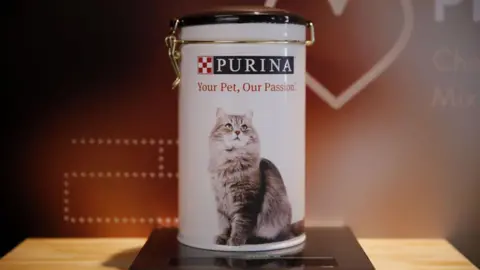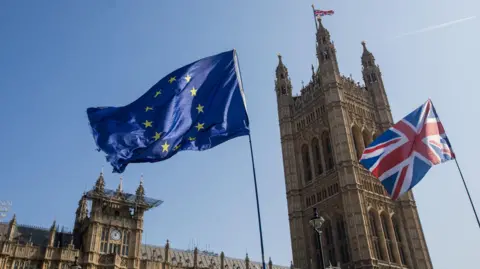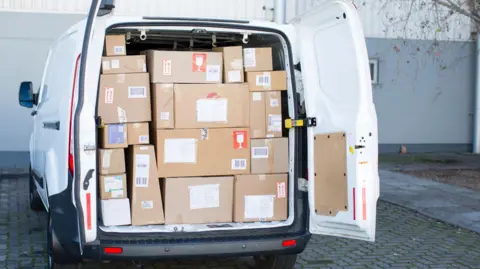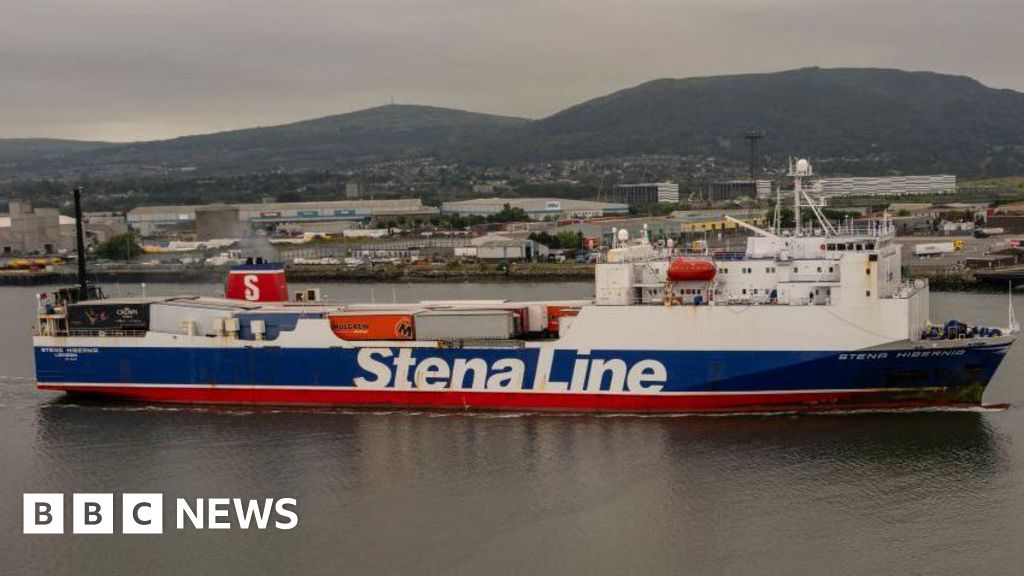 Peter Titmuss/UCG/Universal Images Group via Getty Images
Peter Titmuss/UCG/Universal Images Group via Getty ImagesSome Northern Ireland businesses are concerned about the next implementation phase of the region’s Brexit deal at the end of September.
The main impact will be on the shipping of some parcels from Great Britain to Northern Ireland.
Business-to-business parcels will require customs processes for the first time while parcel carriers will also have to be signed up to a new trusted trader scheme.
The Northern Ireland Chamber of Commerce said the government needs to help with the looming changes and re-engage with wider Brexit issues in Northern Ireland.
 Getty Images
Getty ImagesAs reported by the News Letter, the pet food company Purina has already told customers it is ending a business-to-business sales arrangement in Northern Ireland.
The company said: “We’re sorry to confirm that from Friday 6 September 2024, we will no longer be able to deliver Purina pet food orders by parcel services to professional breeders in Northern Ireland.
“Purina pet food will remain available in retailers and wholesalers across Northern Ireland. We will continue to look for any new opportunities to resume a breeder direct delivery service in the future.”
‘The government must continue to listen to business’
The Northern Ireland Chamber of Commerce’s director of public affairs, Stuart Anderson, said clarity and an urgent plan were needed on parcel movements, “as well as other issues including the operation of the Trader Support Service beyond 2024, and access to veterinary medicines”.
“The government must continue to listen to business and keep implementation under constant review,” he continued.
“It has made economic growth a top priority, and reducing red tape is critical for delivering on this objective.”
 Getty Images
Getty ImagesAfter Brexit, Northern Ireland effectively remained in the EU’s single market for goods.
That meant some new checks and controls have been applied to goods being sent from Great Britain to Northern Ireland – which some have described as the Irish Sea border.
This was originally governed by a UK-EU deal known as the Northern Ireland Protocol. It was revised last year and became the Windsor Framework.
Under the original deal most parcels going from Great Britain to Northern Ireland would have required customs declarations: that was never implemented as businesses and the UK government said it would be unworkable.
The Windsor Framework aims to radically simplify the original proposal while also including measures which give the EU assurance that goods will not illicitly enter its market.
A UK Government spokesperson said it was committed to implementing the framework in good faith and protecting the UK internal market.
“We are continuing to engage with all stakeholders, including businesses and the EU, to ensure its implementation is as smooth as possible,” they added.
 Getty Images
Getty ImagesThere will be no new requirements for consumer-to-consumer parcels and consumers should not notice any changes when buying from Great Britain retailers.
However parcel companies which are carrying goods from Great Britain companies to Northern Ireland consumers will have to be part of a new trusted trader scheme, called the UK Carrier Scheme (UCS).
It will not involve customs declarations but the companies will have to provide information to HMRC.
For example, they will have to show they have a process in place to tell whether their customer’s goods are being sent to a private individual, or a business.
The major charge will be for business-to-business parcels which will have to use the UK Internal Market Scheme (UKIMS).
That involves a simplified customs declaration for goods which are not at risk of moving onwards into the EU.
Goods which are ‘at risk’ will require full customs processes.
Any businesses exclusively sending parcels to consumers will not need to be registered for the UKIMS.
The UK’s biggest parcel operator, Royal Mail, said it was working closely with the government, customers and others to ensure that goods from Great Britain to Northern Ireland continue to flow smoothly when the changes are implemented.
‘Not for EU’ labelling
Another upcoming change is the requirement for a wider range of Great Britain foods products to have ‘Not for EU’ labelling when being sold in Northern Ireland.
Under the Windsor Framework, UK public health and safety standards, rather than EU standards, apply to food and drink being sold by retailers in Northern Ireland.
That means Great Britain traders who are sending food for sale to Northern Ireland consumers should face few routine checks and minimal paperwork.
The flipside of this is the use of ‘Not for EU’ labels on GB food products, to give assurance to the EU that products will not wrongly be sold in its single market.
In the first phase that labelling was limited to pre-packed meat and fresh milk being sent from Great Britain to Northern Ireland.
From 1 October, all milk and dairy products will need to be individually labelled at product level.
The previous government had been planning to extend ‘Not for EU’ labelling to the rest of the UK but later placed that decision under review and held a consultation.
It is understood the current government is still considering the evidence from the consultation and no legislation to give effect to these arrangements has yet been taken forward.
Republic of Ireland agrifood products
Meanwhile it has been confirmed that Republic of Ireland agrifood products being shipped to Great Britain will not face physical checks until next spring at the earliest.
Products from other EU countries have been subject to these checks since the end of April.
When the UK left the EU in 2021, goods from Great Britain going to the EU were immediately subject to customs and regulatory processes.
However, the UK government was not ready to apply controls on EU goods and the introduction of controls has delayed on multiple occasions.
Goods from Northern Ireland going directly to Great Britain do not face any checks or controls as the government has guaranteed they will have “unfettered access.”


